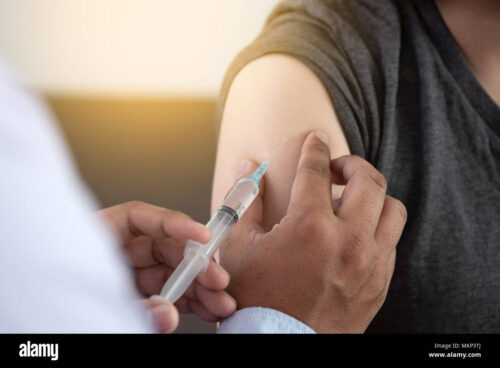Fifth anniversary of landmark decision that will save thousands of lives

This week marks the fifth anniversary of a landmark decision by UK health authorities to extend a cancer-prevention vaccination programme to teenage boys.
The move by the Joint Committee on Vaccination and Immunisation (JCVI) was a significant step forward in the fight against cancer and will save many hundreds of lives.
It also followed a prolonged campaign by cancer charities, cancer specialists including myself and other health professionals to extend the HPV vaccination programme.
The jabs were introduced in 2008 for girls aged 12 and 13 to give them long-term protection against cervical cancer, caused principally by the human papillomavirus (HPV).
But HPV also causes oropharyngeal cancer of the tongue, mouth and throat whose incidence is increasing sharply.
Most of us are exposed to HPV at some point in our lives, but only a small number develop cancer – usually many decades later.
Millions receive jab
Following the decision by the JCVI to extend the vaccination programme to boys as well as girls, many millions of teenage boys have received the jab via their schools.
It is administered in two doses over two or three school years and latest figures show take-up has been high, despite the interruption caused by the COVID pandemic which forced the closure of schools.
The roll-out to boys was started in September 2019 and figures for academic year 2021 to 2022 – the latest available – show take-up was on average well above 70 per cent.
Strong take-up
Experts say the figures are very encouraging considering that COVID restrictions still applied for some of that academic year and school attendance rates remained lower than normal.
As an oncologist, I am delighted to see such strong take-up of the jabs which will provide decades-long protection for young men and women from their youth until mid-life and beyond.
In my work I have seen a significant increase in head and neck cancers and while treatments have improved, prevention remains by far the best course of action.
In extending the HPV vaccination programme to boys as well as girls, the UK followed countries such as Australia, Canada, Germany, New Zealand and Italy which began gender-neutral jabs earlier.
Today more than 50 per cent of the countries around the world offer HPV vaccinations.
Effective protection proven
Research among women shows just how effective the HPV protection is.
Scientists are able to study data because the vaccination programme for girls began 15 years ago, and in a number of countries even earlier.
One piece of research demonstrated that the vaccine has reduced cervical cancer rates by almost 90 per cent in women in their 20s.
Other studies have found that the HPV vaccination is responsible for a 63 per cent reduction in cervical cancer incidence.
Cancer rates set to fall
It is expected that rates of HPV-related cancer in men will experience similar reductions in years to come.
In the US, where the HPV jab was approved for girls in 2006 and for boys in 2009, vaccine coverage is steadily increasing.
A recent study shows that young people aged 13 to 17 with at least one dose rose from 56 per cent in 2015 to 75 per cent in 2020.
The gap between male take-up and girls having the vaccination has also narrowed from 13 per cent in 2015 to just three per cent.
In the UK, the number of teenage boys having the jab is slightly lower than girls, but there are also encouraging signs of the gap narrowing.
For more information about Prof Nutting's work please visit the CV page, get in touch or arrange a consultation.


